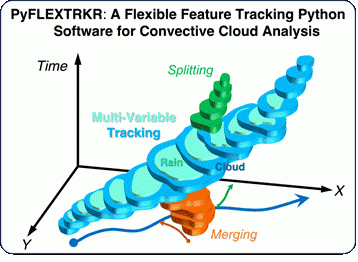A Flexible Feature Tracking Package for Climate Science
Automated feature tracking software has become increasingly popular in weather and climate research. Propagating weather phenomena affect society, making them important targets for improving understanding and prediction. Researchers developed a new open-source framework, PyFLEXTRKR (Python FLEXible object TRacKeR), to facilitate the analysis of propagating phenomena in large datasets from model outputs and long-term observations. The novel package can track any atmospheric features. It has specific capabilities for tracking convective storms in a wide range of model outputs, including high-resolution weather forecasting models and global climate models.
Most existing feature-tracking software only works for specific phenomena or a single type of data. Generally, they are not optimized to work with large volumes of data in modern computing environments. Researchers developed PyFLEXTRKR to overcome these limitations. The new package has a collection of multi-object identification algorithms and scalable parallelization options optimized for large datasets, such as global kilometer-scale satellite and model simulation data. Researchers applied PyFLEXTRKR to track high-impact weather phenomena such as intense convective cells and mesoscale convective systems from model simulation outputs at a wide range of scales.
Processing and analyzing model output to perform scientific studies has become more challenging and resource demanding due to the ever-increasing resolution of weather and climate models, leading to increased data volumes. Feature tracking tools allow researchers to extract the most relevant information from a large amount of data and distill it into a summary of statistics in a Lagrangian framework (e.g., location, time, movement, duration) to facilitate scientific analysis of specific weather phenomena. Researchers developed an open-source framework, PyFLEXTRKR, with a modular design that makes it easy to adapt to tracking different features. PyFLEXTRKR can track 2-D atmospheric objects at any resolution and handle merging and splitting, with the specialized capability to track convective storms from remote sensing observations and model simulations. Visualization, post-processing, and statistical analysis tools are also included in the package to facilitate the analysis of tracking outputs. The work includes examples of convective cell tracking in radar observations and large-eddy simulation outputs, as well as mesoscale convective system tracking in satellite observations, kilometer-scale models, and global climate models. PyFLEXTRKR is actively being used by the research community to explore the ever-growing large model datasets for scientific discovery and contribute to model evaluation and development efforts.

